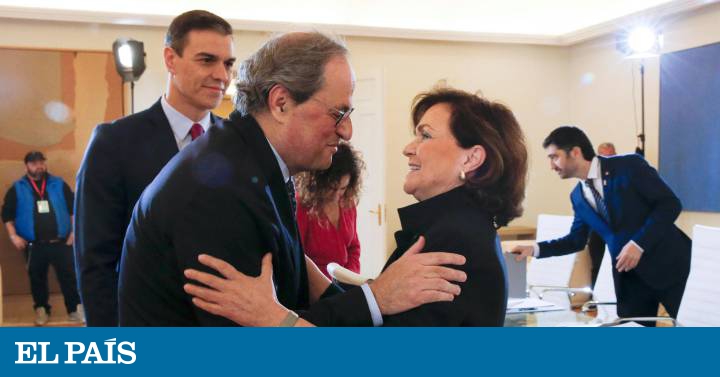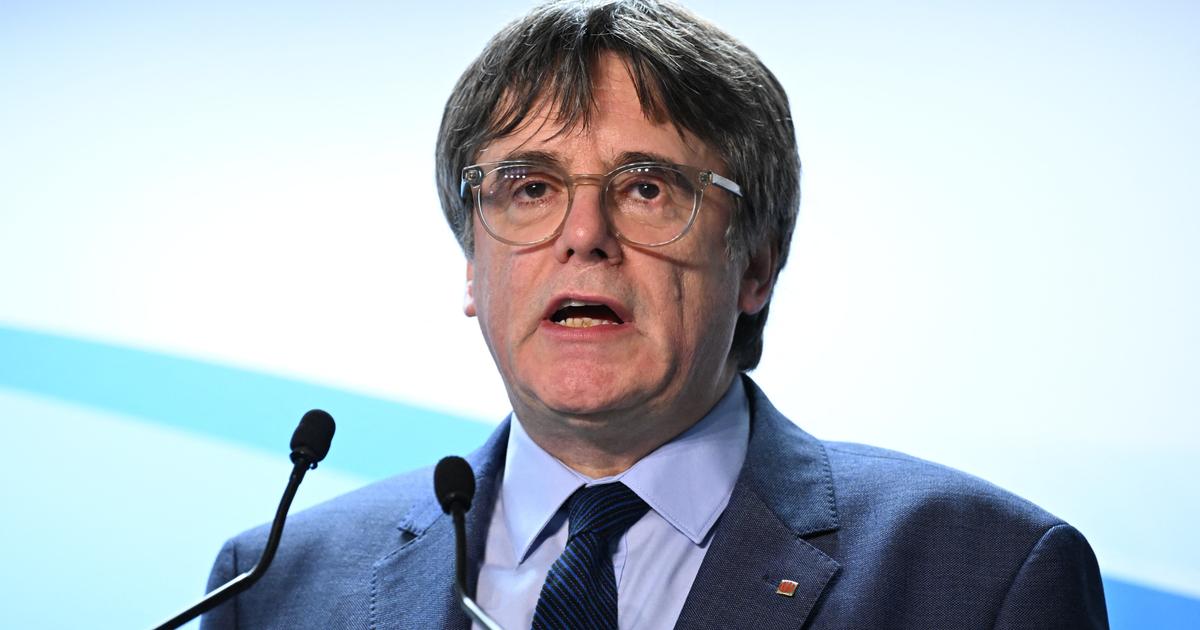The first big discussion of the dialogue table was not, as everyone expected, about how the political conflict can be resolved or if Catalonia has or not the right to vote in a referendum of self-determination. It was something much more basic, which took much of the three hours of meeting between two parties that until recently seemed irreconcilable and on Wednesday they kindly walked through the gardens of La Moncloa and shared several hours of lively debate without any tension. What generated some moderate dialectical crosses, was something that reminded the start of 'Conversation in the cathedral', by Mario Vargas Llosa, with his "At what time was Peru fucked, Zavalita?".
The representatives of the Generalitat and the Government spent long minutes analyzing, with important discrepancies, when the Catalan crisis was distorted, where the origin of all the evils is. The 15 gathered there and several times spoke, although the singing voice was always led by presidents Pedro Sánchez and Quim Torra. Each had nuanced opinions, but the main crossing came, according to several of those present, between Josep María Jové, the so-called architect of the process , charged for his participation in it and key man in the power of ERC, and Carmen Calvo, the Vice President and the person to whom Sánchez has entrusted direct and constant dialogue with the independentistas, and especially with Pere Aragonés, the leader of the Republicans.
Calvo insisted, as the Government tends to say, that the problem began in 2010, when the Constitutional ruling overthrew a part of the Statute. But Jové disagreed, because he believes, as ERC usually defends, that the problem is earlier, and it comes from when the Statute itself was negotiated, between 2003 and 2006, and was done in a way that frustrated many of the Catalans, as It was seen in the limited participation in the referendum.
MORE INFORMATION
- Sánchez warns that the dialogue table on Catalonia will be “difficult, long and complex”
- Esquerra and Bildu pave the way to process the Budgets with their abstention
There were substantive discrepancies, but both groups agreed to hold the PP accountable, which then collected signatures throughout Spain against the Statute and even asked for a referendum across the country to stop it. And also to the Constitutional, then with a conservative majority, because he laid down in the text - agreed by the Parliament, the Congress and endorsed by the Catalans - things that he accepted in other basic laws of communities such as the Valencian or the Andalusian.
Jové explained to them that a part of the Catalans had seen the negotiation of the Statute as a last chance to guarantee the fit between Catalonia and Spain - in its ruling, for example, the Constitutional Court ruled that references to Catalonia as "legal efficacy" do not nation, which were listed in the preamble - and that did not work. They are also criticized for having a "very Madrid" vision of the problem, without understanding that a part of the Catalans were already independentists even before 2006.
This part of the debate was the most intense and basically the least complex to manage, because after all it was only talking about history. More problematic seemed to speak of self-determination. So the Executive devised a way to dodge it.
The Catalan delegation met at the Blanquerna cultural center, headquarters of the Generalitat in Madrid, to have lunch and finish off the previous preparatory sessions. The joint position was clearly agreed before arriving at La Moncloa. According to several ministers agree, everyone was very surprised precisely to see that there were no significant differences between the representatives of Junts per Catalunya and ERC, despite the fact that they are well known and sometimes expressed in public in a stark manner. To the point that Torra has given up the legislature for those apparently insurmountable discrepancies. But in La Moncloa they worked like a block. In fact, even the independence representatives, given the relaxed atmosphere, told Sánchez's ministers that they had been together in Blanquerna.
Torra and Aragones distributed the papers. The president , who started the meeting, focused on defending the Catalan proposal that included unacceptable requirements for the Government: amnesty, right to decide and the need for a mediator. Aragonés, on the other hand, concentrated on highlighting the importance of the table, the methodology that had to be agreed - although it had already been worked hard by the cabinets - and what it meant to start the dialogue. The Government, almost from the beginning, tried to bring the debate to the 44 points that Sanchez had delivered to Torra at his meeting in Barcelona.
The president and his ministers wanted to talk about content, reforms, transfers, economy. But the Catalan delegation, and especially Torra, stopped them right away. Those issues are not for this table, the president explained, but for the State Generalitat Bilateral Commission. There he turned to self-determination, which was where the Catalan delegation wanted to go again and again.
Marta Vilalta, deputy general secretary of ERC and one of those who had the toughest negotiating position during the meetings with the PSOE representatives prior to the investiture, tried to force the Government to define itself. He explained that those 44 points are very important, even urgent, but that they do not resolve the political conflict, and he demanded that they respond to the demand for self-determination and amnesty.
There was a brief silence, because the Government, and especially its president, had that scenario very prepared and had decided that the table had to go well, so they were not going to load the inks with a dispute about a self-determination that the Executive considered totally unfeasible. Sanchez and his team diverted the matter so that the meeting could go ahead and not get caught in the main point of disagreement. The issue is currently parked, but the Government will soon put it back on the table.
Several consulted ministers insist that everyone who sat at that table knows what Sanchez's position is about self-determination and amnesty, because he has repeated it a thousand times, but it was not the time to lock himself in there but to save the meeting. And it was saved, they coincide in both parts, especially because it was agreed to continue. The short break that was made was to finish off the joint statement, the best proof that the meeting went well. The key to that text was the use of the idea of "legal certainty" and not the word Constitution. Never an unsuccessful appointment ends with a strict calendar as agreed and much less with a joint statement. In the end, with the statement resolved, the debate opened up a bit more and everyone could say what they wanted and in some cases even let off steam. At times it seemed, according to some of those present, a kind of therapy of things that have not been said for years.
All the leaders present at the meeting consulted agree that the discrepancies were important, but the tone was very good. And in any case they insist that it was a very useful meeting to dramatize the problem. Above all, as Torra said at the end, because the important thing was the meeting itself and the methodology that was agreed upon, that is: a monthly appointment between the teams and a plenary meeting every six months with the presidents and vice-presidents - a way of Torra de leave Aragonese out of monthly meetings. "There is a brutal estrangement in almost everything but there is a willingness to meet and we have agreed on the methodology, that is not a little," summed up a minister.
No one can get up from the table. There are no incentives for that. Whoever did it would have a huge cost and citizens would make him pay. And the Government of course wants to keep it at all costs, because while there is a table there is a legislature. In the end, Sanchez closed the meeting with a final speech in which he avoided focusing on discrepancies and encouraged everyone to continue meeting to find a point of agreement although it took a long time to find him.
The most important, summarize several of those consulted, is that nobody wants to get up from that table. The Government, because the legislature is doing in it and has opted to ease the situation in Catalonia. ERC, because it is who has designed it. And Junts per Catalunya, because he knows that it would have a great cost for them to be to blame for the break up of the dialogue. So the table is still standing while everyone is interested in continuing. That can be a very long time, although when talking about possible results, everyone is much more skeptical. The independence unit has a new budding challenge: deciding who will be the singing voice without Torra and Aragonès in the meetings


/cloudfront-eu-central-1.images.arcpublishing.com/prisa/2RHNQWZXQVGMDGWKZXB32OMBZY.png)






